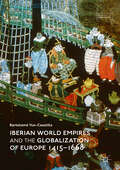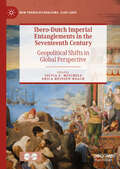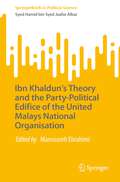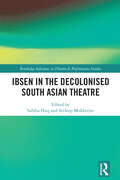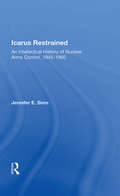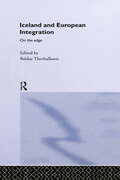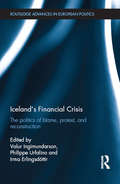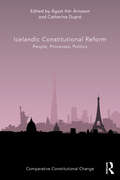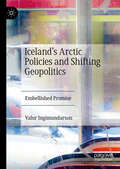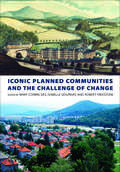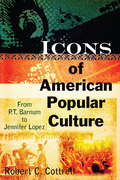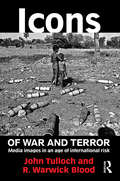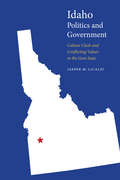- Table View
- List View
Iberian Trade Unionism: Democratization Under the Impact of the European Union
by Jose MagoneOne of the most neglected areas of the European integration process is the role that trade union confederations may play after the full establishment of the Economic and Monetary Union. The gradual establishment of the four freedoms enshrined in the Single European Act would require a transformation of the present strategies of trade union confederations toward more flexibility and towards the ability to take part in different levels of the European integration process. Iberian Trade Unionism highlights the emerging patterns of cooperation between national, subnational, and supranational actors and the impact on these different levels.Unlike most literature on the study of democratization and Europeanization, Iberian Trade Unionism aims to break the dominant focus on political parties and political institutions by raising awareness of the importance of interest groups such as trade union confederations in contributing to a strengthening of democratic governance.The central thesis is that both Portuguese and Spanish trade unions are becoming increasingly part of a transnational European strategy which shapes the internal organizations toward professionalism and democratization. Part 1, "Gontextualizing Iberian Trade Union Strategies," deals with the operations of both Portuguese and Spanish trade union confederations. Part 2, "The National Systems of Interest Intermediation and Trade Union Confederation Strategies," analyzes the transformation of the national systems of intermediation in the 1990s which were affected by a decline in steering power of Spanish and Portuguese political systems vis-a-vis global and European political and economic processes. Part 3, "Subnational and Transnational Policies of Iberian Trade Union Confederations," deals with policies and strategies. The last chapter treats the integration of Iberian trade union confederations in the institutions of the European Union as well as the ITUCs and is based on original research done in Madrid, Lisbon, and Brussels.This timely look at interest groups and lobbying in the European Union will appeal to scholars studying European integration and the role of interest groups in it, and to students of Spain, Portugal, or southern Europe.
Iberian Visions of the Pacific Ocean, 1507–1899
by Rainer F. BuschmannIn this work, Buschmann incorporates neglected Spanish visions into the European perceptions of the emerging Pacific world. The book argues that Spanish diplomats and intellectuals attempted to create an intellectual link between the Americas and the Pacific Ocean.
Iberian World Empires and the Globalization of Europe 1415–1668 (Palgrave Studies in Comparative Global History)
by Bartolomé Yun-CasalillaThis open access book analyses Iberian expansion by using knowledge accumulated in recent years to test some of the most important theories regarding Europe’s economic development. Adopting a comparative perspective, it considers the impact of early globalization on Iberian and Western European institutions, social development and political economies. In spite of globalization’s minor importance from the commercial perspective before 1750, this book finds its impact decisive for institutional development, political economies, and processes of state-building in Iberia and Europe. The book engages current historiographies and revindicates the need to take the concept of composite monarchies as a point of departure in order to understand the period’s economic and social developments, analysing the institutions and societies resulting from contact with Iberian peoples in America and Asia. The outcome is a study that nuances and contests an excessively-negative yet prevalent image of the Iberian societies, explores the difficult relationship between empires and globalization and opens paths for comparisons to other imperial formations.
Ibero-Dutch Imperial Entanglements in the Seventeenth Century: Geopolitical Shifts in Global Perspective (New Transculturalisms, 1400–1800)
by Silvia Z. Mitchell Erica Heinsen-RoachThis book explores the entanglements among Spain, Portugal, and the Dutch Republic during the seventeenth century from a global perspective. It offers a compelling analysis of how Ibero-Dutch relations shifted from violence and conflict—during the Iberian Union (1580–1640) and the Dutch quest for independence (1579–1648)—into collaboration and coexistence in the century’s second half. The encounters between the Iberians and the Dutch in the Pacific, Atlantic, and Mediterranean regions highlight their centrality in geopolitical shifts around the globe. Challenging the paradigm of decline, the contributions gathered here demonstrate that instead, each polity embraced strategic trade-offs and reshaped imperial pursuits that ultimately allowed them to thrive as empires during the entire seventeenth century.
Ibn Khaldun’s Theory and the Party-Political Edifice of the United Malays National Organisation (SpringerBriefs in Political Science)
by Syed Hamid bin Syed Jaafar AlbarThis concise book examines the decline and erosion of UMNO as a dominant political party of Malaysia through the perspective of Ibn Khaldun's theory of asabiyyah and umran. It uses the qualitative method of data collection from Ibn Khaldun's original works. After discussing Ibn Khaldun's theory of asabiyyah and umran, UMNOs umranic contributions and erosion of Malay asabiyyah are discussed in detail. The research outlines how asabiyyah led to UMNOs rise to prominence, gain of political power, bringing of progress and development of Malaysia to an umranic stage before it started to decline and erode in concordance with the five stages of Ibn Khaldun's theory of rise and fall of civilizations. This book highlights that early leaders of UMNO played significant role in fostering group feeling and solidarity of the Malays (asabiyyah). Asabiyyah was the engine that propelled UMNO to transform the Malays and Malaysia to an umranic society. In conclusion, the later leaders of UMNO contributed to weakening of the Malay asabiyyah and the fall of UMNO from power in the 14th General Elections in 2018. The process of UMNOs decline and erosion of political power is primarily caused by the leaders’ failures and shortcomings. The author, a Malaysian lawyer and long-standing Minister in the Prime Minister's Department, Minister of Justice, Minister of Defence, Minister of Foreign Affairs, and Minister of Home Affairs in the Barisan Nasional in Malaysia, concludes with the recommendation that for UMNO to be relevant again in the current political landscape, it must initiate new and serious approaches and initiatives to change itself and must focus on good governance and rule of law in a multi-ethnic Malaysian society. Relevant to scholars and practitioners in political science, sociology, and Islamic studies, this book is a landmark commentary on contemporary Malaysian politics, drawing from the author's own experience as a member of parliament in his various ministerial positions over three decades.
Ibsen in the Decolonised South Asian Theatre (Routledge Advances in Theatre & Performance Studies)
by Sabiha Huq Srideep MukherjeeThis book maps South Asian theatre productions that have contextualised Ibsen’s plays to underscore the emergent challenges of postcolonial nation formation. The concerns addressed in this collection include politico-cultural engagements with human rights, economic and environmental issues, and globalisation, all of which have evolved through colonial times and thereafter. This book contemplates why and how these Ibsen texts were repeatedly adapted for the stage and consequently reflects upon the political intent of this appropriative journey of the foreign playwright. This book tracks the unmapped agency that South Asian theatre has acquired through aesthetic appropriation of Ibsen and thereby contributes to his global reception. This collection will be of great interest to students and scholars of theatre and performance studies.
Ibss Poli Sci 29 1980
by "International Committee For Social Sciences Documentation"The International Bibliography of the Social Sciences (IBSS) is an essential tool for librarians, academics and researchers wishing to be kept up to date with the published literature in the social sciences. IBSS is compiled in four divisions; Anthropology, Sociology, Economics, and Political Science. This is Volume XXIX of the International bibliography of political science as of 1980.
Icarus
by Bertrand RussellMr. Haldane&’s Daedalus has set forth an attractive picture of the future as it may become through the use of scientific discoveries to promote human happiness. Much as I should like to agree with his forecast, a long experience of statesmen and governments has made me somewhat sceptical. I am compelled to fear that science will be used to promote the power of dominant groups, rather than to make men happy. Icarus, having been taught to fly by his father Daedalus, was destroyed by his rashness. I fear that the same fate may overtake the populations whom modern men of science have taught to fly.
Icarus Restrained: An Intellectual History Of Nuclear Arms Control, 1945-1960
by Jennifer SimsThe author cites that this is a study of the nature and origins of the dominant post-war approach to strategic nuclear arms control in an attempt to clarify it, distinguish it from others, and begin to explain the qualities which made it so attractive and eventually so widely accepted. The study ends with the early 1960s by which time the central t
Ice Fire
by David LyonsIn this explosive debut thriller, a judge from the Louisiana bayou goes up against a company on the verge of causing an ecological disaster. Cajun-born Jock Boucher has overcome modest beginnings to assume the prestigious position of U.S. District Judge for the Eastern District of Louisiana. One of his first cases on the bench involves a scientist who has been hiding in mortal fear for more than twenty years. The fugitive claims that another judge accepted bribes and helped a relentless global energy company steal his intellectual property: a way to recover energy from below the subsea bed that could end America's dependence on foreign oil. Boucher takes on the company and its powerful founder, risking not only his judicial career but his life. He follows a trail of cryptic clues to the bottom of the ocean, and soon finds himself the target of killers--and too far from the law to ever return. Packed with suspense, science, politics, and murder, this fast-paced, riveting thriller will have readers on the edge of their seats. Ice Fire is the first in a series offered by this authentic new talent.
Icebergs, Zombies, and the Ultra-Thin: Architecture and Capitalism in the 21st Century
by Matthew Soules"Soules's excellent book makes sense of the capitalist forces we all feel but cannot always name… Icebergs, Zombies, and the Ultra Thin arms architects and the general public with an essential understanding of how capitalism makes property. Required reading for those who think tomorrow can be different from today."— Jack Self, coeditor of Real Estates: Life Without DebtIn Icebergs, Zombies, and the Ultra Thin, Matthew Soules issues an indictment of how finance capitalism dramatically alters not only architectural forms but also the very nature of our cities and societies. We rarely consider architecture to be an important factor in contemporary economic and political debates, yet sparsely occupied ultra-thin "pencil towers" develop in our cities, functioning as speculative wealth storage for the superrich, and cavernous "iceberg" homes extend architectural assets many stories below street level. Meanwhile, communities around the globe are blighted by zombie and ghost urbanism, marked by unoccupied neighborhoods and abandoned housing developments.Learn how the use of architecture as an investment tool has accelerated in recent years, heightening inequality and contributing to worldwide financial instability:• See how investment imperatives shape what and how we build, changing the very structure of our communities• Delve into high-profile projects, like the luxury apartments of architect Rafael Viñoly's 432 Park Avenue• Understand the convergence of technology, finance, and spirituality, which together are configuring the financialized walls within which we eat, sleep, and workIncludes dozens of photos and drawings of architectural phenomena that have changed the way we live. Essential reading for anyone interested in architecture, design, economics, and understanding the way our world is formed.
Icebound: A chilling thriller of a race against time
by Dean KoontzA desperate struggle for survival... Set in the Arctic icefields, Dean Koontz's Icebound is a compelling thriller that delivers icy chills. Perfect for fans of Harlan Coben and Richard Laymon. 'Jammed with the tensions of imminent disaster. The whole thing unfolds with the timing of a quartz watch' - Chicago TribuneA widespread drought is causing murderous famine. There is one possible solution: Arctic ice could be moved south to parched coastlines and melted for water. In an Arctic icefield, a special team of scientists have planted bombs that will detonate automatically at midnight to break away some of the ice. Before they withdraw to the safety of their base camp, a shattering tidal wave breaks loose the ice on which they are working. Now they are marooned on an iceberg during the worst winter storm of the decade. The bombs in the ice beneath them are buried irretrievably deep... and ticking. Abruptly thrown into a desperate struggle for survival, the scientists are plagued by the discovery that one of them is a ruthless killer on a strange mission of his own... What readers are saying about Icebound: 'The thrilling chain of events that follows, in the race to disarm all the explosives, is positively gripping''The plot unfurls with a frozen precision that grips you with its icy fingers, always intriguing, always willing you to guess what comes next''I read this book in one sitting. Just could not put it down. Can Koontz get any better?'
Iceland and European Integration: On the Edge (Europe and the Nation State #Vol. 7)
by Baldur ThorhallssonWhy has Iceland not sought membership of the European Union?This unique volume uses the case study of Iceland - the only Nordic state to have never applied for EU membership - to explore the complex attitudes of small states to European intergration and provide a new theoretical approach for understanding such relationships.The contributors explain why the Icelandic political elite has been relunctant to participate in European integration. In this context, they analyse the influence that Iceland's special relationship with the US and the fisheries sector have had on their dealings with the EU. Also considered are 'new' variables, such as national administrative characteristics and particular features of the domestic arena of the political elite, as well as the elite's perception of international relations and its political discourse concerning independence and sovereignty.Iceland and European Integration will appeal to all those interested in European integration and the international relations of small states
Iceland's Financial Crisis: The Politics of Blame, Protest, and Reconstruction (Routledge Advances in European Politics)
by Valur Ingimundarson Philippe Urfalino Irma ErlingsdóttirBeing the first casualty of the international financial crisis, Iceland was, in many ways, turned into a laboratory when it came to responding to one of the largest corporate failures on record. This edited volume offers the most wide-ranging treatment of the Icelandic financial crisis and its political, economic, social, and constitutional consequences. Interdisciplinary, with contributions from historians, economists, sociologists, legal scholars, political scientists and philosophers, it also compares and contrasts the Icelandic experience with other national and global crises. It examines the economic magnitude of the crisis, the social and political responses, and the unique transitional justice mechanisms used to deal with it. It looks at backward-looking elements, including a societal and legal reckoning – which included the indictment of a Prime Minister and jailing of leading bankers for their part in the financial crisis – and forward-looking features, such as an attempt to rewrite the Icelandic constitution. Throughout, it underscores the contemporary relevance of the Icelandic case. While the Icelandic economic recovery has been much quicker than expected; it shows that public faith in political elites has not been restored. This text will be of key interest to scholars, policy-makers and students of the financial crisis in such fields as European politics, international political economy, comparative politics, sociology, economics, contemporary history, and more broadly the social sciences and humanities.
Icelandic Constitutional Reform: People, Processes, Politics (Comparative Constitutional Change)
by Ágúst Þór Árnason; Catherine DupréThis collection documents, analyses, and reflects on the Icelandic constitutional reform between 2009 and 2017. It offers a unique insight into this process by providing first-hand accounts of its different stages and core issues. Its 12 substantive chapters are written by the main actors in the reform, including the Chair of the Constitutional Council that drafted the 2011 Proposal for a New Constitution. Part I opens with an address by the President of the Republic and positions the constitutional reform in its full complexity and longer-term perspective, going beyond the frequent portrayal of that process in international discussion as being solely a result of the 2008 financial crisis. Part II offers a nuanced and contextualised reflection on Iceland’s innovative approach to consultation and drafting involving lay participants, including its twenty-first-century digital take on ‘the people,’ which attracted international attention as ‘crowdsourcing.’ Part III analyses the main constitutional amendment proposals, and focuses on natural resources and environmental protection, which lie at the heart of Iceland’s identity. The final part reflects on the reform’s wider significance and includes an interview with the current Prime Minister, who is now taking the reform forward. The volume provides a basis for reflection on a groundbreaking constitutional reform in a democratic context. This long and complex process has challenged and transformed the ways in which constitutional change can be approached, and the collection is an invitation to discuss further the practical and theoretical dimensions of Iceland’s experience and their far-reaching implications.
Iceland’s Arctic Policies and Shifting Geopolitics: Embellished Promise
by Valur IngimundarsonThis book examines the role of the Arctic in Iceland’s foreign and security policies from the end of the Cold War to the present. Based on extensive research and drawing on approaches from the fields of history and international relations, it shows that Iceland’s Arctic policies have gone through multiple phases during this period, all of which have been heavily influenced by external geopolitical factors, including its relationship with the United States, the 2008 financial crisis, the rise of China, and the Ukrainian crisis. It also demonstrates how Iceland’s strategic position in the North Atlantic has important repercussions for the United States, Russia and China. With an emphasis on geopolitics, nation branding, and governance, this book will appeal to scholars and students of Arctic policies, geopolitics and international relations.
Iceta
by Raúl MontillaLa biografía de Miquel Iceta, actual líder del PSC. Un personaje clave de la política española y catalana de las últimas cuatro décadas no solo como testigo, sino como parte activa de ella. «En mi lápida pondrá: era gay y bailó», bromea Miquel Iceta mientras ordena algunos libros en su pequeño despacho en la sede del PSC, donde se amontonan libros y se apilan papeles. Una montaña está coronada por una lata de Coca-Cola Zero. Es adicto a este refresco, casi tanto como a la política en cuyas bambalinas está desde hace cuarenta años. Fue hombre de confianza de Narcís Serra en La Moncloa, donde vivió la caída de Felipe González. Eran las noches en las que, junto con José Enrique Serrano, iba al quiosco de la Puerta del Sol para comprar los primeros diarios. Los años de los GAL, Roldán y las escuchas ilegales. Luego vendría la candidatura de Josep Borrell: Iceta fue una pieza clave en aquella victoria y vivió en primera línea la caída del líder que prometía un giro a la izquierda del PSOE. Esta biografía autorizada, que llega en un momento político crucial, se ha escrito en colaboración directa con el propio Iceta, amodo de crónica periodística donde se intercambian vivencias, datos, conversaciones y situaciones, en un lenguaje directo y ameno.
Icon (Core Ser.)
by Frederick ForsythFrom the master of the novel of international intrigue comes a riveting new book as timely and unsettling as tomorrow's headlines.It is summer 1999 in Russia, a country on the threshold of anarchy. An interim president sits powerless in Moscow as his nation is wracked by famine and inflation, crime and corruption, and seething hordes of the unemployed roam the streets.For the West, Russia is a basket case. But for Igor Komarov, one-time army sergeant who has risen to leadership of the right-wing UPF party, the chaos is made to order. As he waits in the wings for the presidential election of January 2000, his striking voice rings out over the airwaves offering the roiling masses hope at last--not only for law, order, and prosperity, but for restoring the lost greatness of their land.Who is this man with the golden tongue who is so quickly becoming the promise of a Russia reborn? A document stolen from party headquarters and smuggled to Washington and London sends nightmare chills through those who remember the past, for this Black Manifesto is pure Mein Kampf in a country with frightening parallels to the Germany of the Weimar Republic.Officially the West can do nothing, but in secret a group of elder statesmen sends the only person who can expose the truth about Komarov into the heart of the inferno. Jason Monk, ex-CIA and "the best damn agent-runner we ever had," had sworn he would never return to Moscow, but one name changes his mind. Colonel Anatoli Grishin, the KGB officer who tortured and murdered four of Monk's agents after they had been betrayed by Aldrich Ames, is now Komarov's head of security.Monk has a dual mission: to stop Komarov, whatever it takes, and to prepare the way for an icon worthy of the Russian people. But he has a personal mission as well: to settle the final score with Grishin. To do this he must stay alive--and the forces allied against him are ruthless, the time frighteningly short....
Iconic Planned Communities and the Challenge of Change (The City in the Twenty-First Century)
by Robert Freestone Mary Corbin Sies Isabelle GournayIn the history of planning, the design of an entire community prior to its construction is among the oldest traditions. Iconic Planned Communities and the Challenge of Change explores the twenty-first-century fortunes of planned communities around the world. Drawing on interdisciplinary perspectives, the editors and contributors examine what happened to planned communities after their glory days had passed and they became vulnerable to pressures of growth, change, and even decline.Beginning with Robert Owen's industrial village in Scotland and concluding with Robert Davis's neotraditional resort haven in Florida, this book documents the effort to translate optimal design into sustaining a common life that works for changing circumstances and new generations of residents. Basing their approach on historical research and practical, on-the-ground considerations, the essayists argue that preservation efforts succeed best when they build upon foundational planning principles, address landscape, architecture, and social engineering together, and respect the spirit of place.Presenting twenty-three case studies located in six continents, each contributor considers how to preserve the spirit of the community and its key design elements, and the ways in which those elements can be adapted to contemporary circumstances and changing demographics. Iconic Planned Communities and the Challenge of Change espouses strategies to achieve critical resilience and emphasizes the vital connection between heritage preservation, equitable sharing of the benefits of living in these carefully designed places, and sustainable development.Communities: Bat'ovany-Partizánske, Cité Frugès, Colonel Light Gardens, Den-en Chôfu, Garbatella, Greenbelt, Hampstead Garden Suburb, Jardim América, Letchworth Garden City, Menteng, New Lanark, Pacaembú, Radburn, Riverside, Römerstadt, Sabaudia, Seaside, Soweto, Sunnyside Gardens, Tapiola, The Uplands, Welwyn Garden City, Wythenshawe.Contributors: Arnold R. Alanen, Carlos Roberto Monteiro de Andrade, Sandra Annunziata, Robert Freestone, Christine Garnaut, Isabelle Gournay, Michael Hebbert, Susan R. Henderson, James Hopkins, Steven W. Hurtt, Alena Kubova-Gauché, Jean-François Lejeune, Maria Cristina a Silva Leme, Larry McCann, Mervyn Miller, John Minnery, Angel David Nieves, John J. Pittari, Jr., Gilles Ragot, David Schuyler, Mary Corbin Sies, Christopher Silver, André Sorensen, R. Bruce Stephenson, Shun-ichi J. Watanabe.
Icons Axed, Freedoms Lost: Russian Desecularization and a Ukrainian Alternative
by Vyacheslav Karpov Rachel L. SchroederIn Icons Axed, Freedoms Lost, Vyacheslav Karpov and Rachel L. Schroeder demonstrate how Russia went from persecuting believers to jailing critics of religion and why, in contrast, religious pluralism and tolerance have solidified in Ukraine. Offering a richly documented history of cultural and political struggles that surrounded desecularization—the resurgence of religion’s societal role—from the end of the USSR to the Russo-Ukrainian war, they show Russian critics of desecularization adhered to artistic provocations, from axing icons to “punk-prayers” in cathedrals, and how Orthodox activists, in turn, responded by vandalizing controversial exhibits and calling on the state to crush “the enemies of the Church.” Putin’s solidifying tyranny heard their calls and criminalized insults to religious feelings. Meanwhile, Ukraine adhered to its pluralistic legacies. Its churches refused to engage in Russian-style culture wars, sticking instead to forgiveness and forbearance. Icons Axed, Freedoms Lost offers original theoretical and methodological perspectives on desecularization applicable far beyond the cases of Russia and Ukraine.
Icons Of Irishness From The Middle Ages To The Modern World
by Maggie M. WilliamsFrom majestic Celtic crosses to elaborate knotwork designs, visual symbols of Irish identity at its most medieval abound in contemporary culture. Consdering both scholarly and popular perspectives this book offers a commentary on the blending of pasts and presents that finds permanent visualization in these contemporary signs.
Icons of American Popular Culture: From P.T. Barnum to Jennifer Lopez
by Robert C. CottrellTraces the evolution of American popular culture over the past two centuries. In a lengthy chronology of landmark events, and ten chapters, each revolving around the lives of two individuals who are in some way emblematic of their times, this provides a window on the social, economic, and political history of US democracy from the antebellum period to the present.
Icons of War and Terror: Media Images in an Age of International Risk (Media, War and Security)
by John Tulloch R. Warwick BloodThis book explores the ideas of key thinkers and media practitioners who have examined images and icons of war and terror. Icons of War and Terror explores theories of iconic images of war and terror, not as received pieties but as challenging uncertainties; in doing so, it engages with both critical discourse and conventional image-making. The authors draw on these theories to re-investigate the media/global context of some of the most iconic representations of war and terror in the international ‘risk society’. Among these photojournalistic images are: Nick Ut’s Pulitzer Prize winning photograph of a naked girl, Kim Phuc, running burned from a napalm attack in Vietnam in June 1972; a quintessential ‘ethnic cleansing’ image of massacred Kosovar Albanian villagers at Racak on January 15, 1999, which finally propelled a hesitant Western alliance into the first of the ‘new humanitarian wars’; Luis Simco’s photograph of marine James Blake Miller, ‘the Marlboro Man’, at Fallujah, Iraq, 2004; the iconic toppling of the World Trade Centre towers in New York by planes on September 11, 2001; and the ‘Falling Man’ icon – one of the most controversial images of 9/11; the image of one of the authors of this book, as close-up victim of the 7/7 terrorist attack on London, which the media quickly labelled iconic. This book will be of great interest to students of media and war, sociology, communications studies, cultural studies, terrorism studies and security studies in general.
Ida B. Wells: Discovering History's Heroes (Jeter Publishing)
by Diane BaileyJeter Publishing presents a brand-new series that celebrates men and women who altered the course of history but may not be as well-known as their counterparts. Ida B. Wells was an African-American journalist and activist who led an anti-lynching crusade in the United States in the 1890s. On one fateful train ride from Memphis to Nashville, in May 1884, Wells reached a personal turning point. Having bought a first-class train ticket, she was outraged when the train crew ordered her to move to the car for African Americans. She refused and was forcibly removed from the train—but not before she bit one of the men on the hand. Wells sued the railroad, winning a $500 settlement. However, the decision was later overturned by the Tennessee Supreme Court. This injustice led Ida B. Wells to pick up a pen to write about issues of race and politics in the South. Using the moniker “Iola,” a number of her articles were published in black newspapers and periodicals. Wells eventually became an owner of the Memphis Free Speech and Headlight, and, later, of the Free Speech. She even took on the subject of lynching, and in 1898, Wells brought her anti-lynching campaign to the White House, leading a protest in Washington, DC, and calling for President William McKinley to make reforms. Ida B. Wells never backed down in the fight for justice.
Idaho Politics and Government: Culture Clash and Conflicting Values in the Gem State (Politics and Governments of the American States)
by Jasper M. LiCalziExamining politics in Idaho through the lens of ideology (i.e., conservative versus liberal) or partisanship (i.e., Democrat versus Republican) does not illuminate the more fundamental dynamics of the state’s political environment. Unlike other states that are divided on partisan or traditional ideological lines, Idaho tends to be divided between its libertarian and communitarian visions of the role of government and the place of the individual in society. In Idaho Politics and Government, Jasper M. LiCalzi examines the complex world of Idaho politics, where morality dominates but a heartily libertarian strain of individualism keeps lawmakers from falling into the liberal versus conservative dialogue prevalent in other states. After opening with the ultrasound bill failure as a recent example of Idaho’s political culture, LiCalzi traces the influence of individuals and party factions from the 1960s through the present before moving on to the inner workings of government itself, with all its institutions and extra-governmental extensions. He closes with another recent Idaho bill concerning the topics of child support and Sharia (Islamic) law, giving readers yet another glimpse of the workings of Idaho politics and the continuing clash between the community and the individual. Presenting a continuum of political views from an emphasis on the individual (personified by Thomas Jefferson) to a focus on community (personified by Alexander Hamilton), LiCalzi provides a new method for understanding political actions and situations in Idaho.


